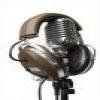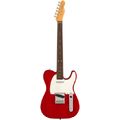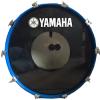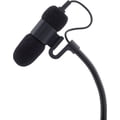Improvisation 101

SUPPORTER
Posts: 541
Joined: Nov 25, 2013
Here’s a simple exercise that shouldn’t be much of a challenge. IMHO improvisation starts with you and many/most of you have an innate ability to improvise. What’s often lacking is a means of transferring that ability to an instrument.
Exercise 1
Sing “Happy birthday to you” without the words. You don’t have to have a good voice, but be aware of whether you hear in your head the correct pitch (even if your voice can’t match it). It should be obvious that you couldn’t begin to sing this simple tune if you couldn’t conceive of it in your head.
Exercise 2
Pick a random note (other than the previous one you used/sang) and sing “Happy birthday to you” again. Did you find it difficult to hear the notes after your random note? Was this easy? If yes, then congratulations, you can transpose by ear. If you had difficulty, then music and improvisation may not be easy for you.
Exercise 3
This time sing “Happy birthday to you” (without the words) at a very slow speed and add notes between that “embellish” and lengthen the tune. You can take this in any direction you like as a mournful tune, ballad, etc. Try to have a feel and story behind the notes. Easy? If yes you can improvise...simple as that! This is a basic “theme and variation” style of improvisation. It’s the first stepping stone towards a world of improvised music. You can make up a myriad of other variations for yourself.
I’d enjoy hearing back from those of you who tried this to see how many of you found it easy or difficult.
Exercise 1
Sing “Happy birthday to you” without the words. You don’t have to have a good voice, but be aware of whether you hear in your head the correct pitch (even if your voice can’t match it). It should be obvious that you couldn’t begin to sing this simple tune if you couldn’t conceive of it in your head.
Exercise 2
Pick a random note (other than the previous one you used/sang) and sing “Happy birthday to you” again. Did you find it difficult to hear the notes after your random note? Was this easy? If yes, then congratulations, you can transpose by ear. If you had difficulty, then music and improvisation may not be easy for you.
Exercise 3
This time sing “Happy birthday to you” (without the words) at a very slow speed and add notes between that “embellish” and lengthen the tune. You can take this in any direction you like as a mournful tune, ballad, etc. Try to have a feel and story behind the notes. Easy? If yes you can improvise...simple as that! This is a basic “theme and variation” style of improvisation. It’s the first stepping stone towards a world of improvised music. You can make up a myriad of other variations for yourself.
I’d enjoy hearing back from those of you who tried this to see how many of you found it easy or difficult.
+9

SUPPORTER
Posts: 372
Joined: Feb 3, 2013
this is a cool idea Wade, but you probably know I just make it all up as i go along anyway.... :D I have had no formal musical training and I rely on my ears and feelings to write lyrics and sing..but hey, I think it works for me so far :)
+8

Fender AV II 63 TELE RW RED TRANS
Electric Guitar

$2,055
iThis widget links to Thomann, our affiliate partner. We may receive a commission when you purchase a product there.
Visit Shop

SUPPORTER
Posts: 935
Joined: Feb 14, 2018
Hmmm that sounds like an interesting exercise Wade, but with "Happy birthday" I find it hard *not* to think of Steve Wonder ;)
To be honest, I have done this many times, especially when walking alone (which I love). I can spend hours, and it won't ever get boring. Even if nowadays I'd probably sound more like Tom Waits than like Steve Wonder :D
To be honest, I have done this many times, especially when walking alone (which I love). I can spend hours, and it won't ever get boring. Even if nowadays I'd probably sound more like Tom Waits than like Steve Wonder :D
+4
SUPPORTER
Posts: 221
Joined: Jul 16, 2015
Sounds like a whole lot of work:P
+2

Member
Posts: 522
Joined: Feb 27, 2015
A very interesting exercise! My hatred of the sound of my singing voice might make this hard for me (I can 'hear' in tune but making my voice do it is another matter entirely!).
+3

SUPPORTER
Posts: 541
Joined: Nov 25, 2013
FrankieJ wrote:
Sounds like a whole lot of work:P
Sounds like a whole lot of work:P
Wow somebody's having a hard day! All three exercise can be done in just over 1 minute.
+1
SUPPORTER
Posts: 221
Joined: Jul 16, 2015
Wade wrote:
Wow somebody's having a hard day! All three exercise can be done in just over 1 minute.
Wow somebody's having a hard day! All three exercise can be done in just over 1 minute.
I get nervous thinking about singing :)
+1

SUPPORTER
Posts: 541
Joined: Nov 25, 2013
FrankieJ wrote:
I get nervous thinking about singing :)
Wade wrote:
Wow somebody's having a hard day! All three exercise can be done in just over 1 minute.
Wow somebody's having a hard day! All three exercise can be done in just over 1 minute.
I get nervous thinking about singing :)
The exercise is less about what comes out of your mouth and more about if you're hearing the notes accurately in your head. In fact, if you can hear that the notes you're singing are out of tune, it means that you know what the right sound is!!!
This is really about improvisation being a mental process that can/should start with you. There are many training programs which teach "theoretical" improvisation in which cut and paste riffs and arpeggios are used to embellish chord changes instead of your "singing voice". It's pretty easy to spot the theory types as they tend to be showy, busy, and lacking melodic or communicative ideas. I certainly don't think you play that way at all.
This is just a gentle exercise to gauge how many people can hear/sing improvised lines (my guess is most people can). It could also be a little light bulb going off for some who have only been taught the "theory" route and give them the impetus to explore other methods of improvisation.
Be brave!!!!
+2

the t.bone Ovid System CC 100
Condenser Clip Microphone for Ovid System

$45
iThis widget links to Thomann, our affiliate partner. We may receive a commission when you purchase a product there.
Visit Shop

SUPPORTER
Posts: 935
Joined: Feb 14, 2018
Singing your improvisation first has another advantage: you have to think about when to breathe... this is so totally different from "noodling" endless lines IMO :)
+2
SUPPORTER
Posts: 299
Joined: Jun 2, 2018
For me hearing the right note is hit and miss, sometimes I hear the melody and sometimes I hear a complimenting harmony note, and sometimes I'm so far off I want to give up and leave it to musicians and singers that influence me the most. I tend to hear and sing a note more accurately when the music is at a lower volume but that's probably a sign of ADD, you know like being in a noisy room with several people talking at the same time and finding it hard to concentrate. I'm all for any exercise that will improve my singing or music ability. I don't know if I really want to find out that I suck at hearing notes correctly for sure though lol!:)
+1

SUPPORTER
Posts: 763
Joined: Jan 7, 2013
wjl wrote:
Singing your improvisation first has another advantage: you have to think about when to breathe... this is so totally different from "noodling" endless lines IMO :)
Singing your improvisation first has another advantage: you have to think about when to breathe... this is so totally different from "noodling" endless lines IMO :)
this is a very important observation ... in my books any improvisation no matter the instrument played should respect the breathing part ! if there's no breathing there's no life ! it's a principle i always keep in mind thus the lines in my impro sounding like a brass instrument played on guitar :) well kind of :D
+4
SUPPORTER
Posts: 2098
Joined: Sep 27, 2014
Hmmmm I remember you playing the big brass instrument in Steinfeld :D :D :D You sounded like an angry cow with severe respiratory issues. Muuuuuuarghh!!! :D :D :D [img]https://wloops2.r.worldssl.net/galleries/8868/files/ac23feb9cdde7788e5fd83fb3f87d061.jpg[/img]
+5

Fender AV II 63 TELE RW RED TRANS
Electric Guitar

$2,055
iThis widget links to Thomann, our affiliate partner. We may receive a commission when you purchase a product there.
Visit Shop

SUPPORTER
Posts: 763
Joined: Jan 7, 2013
oooh yea :D this was a very interesting experience for sure ! something in between a sick old whale and the high on dope mad cow ôÔ very strange !
+2

SUPPORTER
Posts: 541
Joined: Nov 25, 2013
wjl wrote:
Singing your improvisation first has another advantage: you have to think about when to breathe... this is so totally different from "noodling" endless lines IMO :)
Singing your improvisation first has another advantage: you have to think about when to breathe... this is so totally different from "noodling" endless lines IMO :)
Good observation. And as OlivBee has hinted this is a good exercise for instrumental players that don't need breathe to play their instrument (keys, strings, percussion, etc.). Phrasing is a natural break that is about breathing. My guess is that listeners tend to "sync" to the music and breathe with the player's phrases. We seem to be hardwired for hearing in phrases, so playing with your breathing works. For singers or those of us who play instruments that require breath for the sound, it comes naturally.
There was (is?) a cello teaching style that forced students to breathe in exaggeration which forced the learning cellist to phrase with those breaths. Works well, except that somebody forgot to tell them to shut down the exaggerated breathing when recording. There's now heaps of fine cellists who have destroyed otherwise great recordings by snorting away during their playing.
+1
wikiloops online jamsessions are brought to you with friendly
support by:

Cheerz to the non-commercial site for music-lovers!
will_C